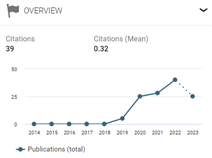Uji aktivitas antibiofilm ekstrak daun kirinyuh (Chromolaena odorata l.) dari kawasan geotermal Ie Seum terhadap staphylococcus aureus
DOI: 10.30867/gikes.v5i3A.1844Abstract
Background:Food is a basic human necessity for survival. The existence of food handlers provides an important role in maintaining food quality. Food consumed must meet safety standards so as not to pose a health risk. So knowledge about personal hygiene and food sanitation is needed to be key in preventing the risk of contamination. Food handlers should gain increased knowledge and behavior through education to prevent health risks caused by lack of knowledge
Objectives: This study aims to explore the influence of education related to hygiene and sanitation through the media of videos, posters, and educational mirrors on increasing knowledge and attitudes of food handlers.
Methods: This study uses the SLR method of special research design sourced from google scholar and, Pubmed from the last 10 years using inclusion and exclusion criteria in this study following the approach of Population / Problem, Intervention, Comparison Outcome and Study design type (PICOS).
Results: The results included three articles that assessed the effects of education using video communication media, posters, and educational mirrors on improving the knowledge and attitudes of food handlers. The installation of personal hygiene posters is effective in all age groups, while visual media such as videos have a significant positive impact with visual media having a positive impact on increasing one's knowledge by 75%-87%.
Conclusion: Education through media through the media of videos, posters, and educational mirrors can help increase the knowledge and attitude of food handlers, support safety and hygiene in food provision
Keywords
Hygiene education, communication media, knowledge and attitudes of food handlers
Keywords
Full Text:
PDFReferences
Abd El-Hamid, M. I., Y. El-Naenaeey, E., M kandeel, T., Hegazy, W. A. H., Mosbah, R. A., Nassar, M. S., Bakhrebah, M. A., Abdulaal, W. H., Alhakamy, N. A., & Bendary, M. M. (2020). Promising antibiofilm agents: Recent breakthrough against biofilm producing methicillin-resistant Staphylococcus aureus. Antibiotics, 9(10), 667. https://doi.org/10.3390/antibiotics9100667
Al-Hajjaj, Y. A., Kabli, S. A., Al-Garni, S. M., Moqaddam, S. A., & El-Tayeb, M. A. (2021). Molecular characterization of cassette chromosome mec groups in methicillin-resistant staphylococcus aureus. Journal of Applied Sciences Research, 17(3), 1–8. https://doi.org/10.22587/jasr.2021.17.3.1
Alotaibi, G. F., & Bukhari, M. A. (2021). Factors influencing bacterial biofilm formation and development. Am. J. Biomed. Sci. Res, 12(6), 617–626.
https://doi.org/ 10.34297/AJBSR.2021.12.001820
Besan, E. J., Rahmawati, I., & Saptarini, O. (2023). Aktivitas antibiofilm ekstrak dan fraksi-fraksi bunga telang (clitoria ternatea l.) terhadap staphylococcus aureus. PHARMACY: Jurnal Farmasi Indonesia (Pharmaceutical Journal of Indonesia), 20(1), 1–11. https://doi.org/ 10.30595/pharmacy.v0i0.14437
Bjarnsholt, T., Jensen, P. Ø., Moser, C., & Høiby, N. (2011). Biofilm infections. Springer. https://link.springer.com/book/10.1007/978-1-4419-6084-9
Depkes, R. I. (2013). Suplemen III farmakope herbal indonesia, Edisi I. Jakarta. Kementrian Kesehatan RI.
Dewi, M., Darmawi, D., Nurliana, N., Karmil, T. F., Helmi, T. Z., Fakhrurrazi, F., Erina, E., Abrar, M., AK, M. D., & Admi, M. (2020). Aktivitas antibiotik terhadap biofilm staphylococcus aureus isolat preputium sapi aceh (antibiotic activities to staphylococcus aureus biofilms of aceh cattle preputium isolate). Jurnal Sain Veteriner, 38(1), 1–6. https://doi.org/ 10.22146/jvs.35219
Hidayat, M. (2018). Analisis vegetasi dan keanekaragaman tumbuhan di kawasan manifestasi geotermal Ie Suum Kecamatan Mesjid Raya Kabupaten Aceh Besar. BIOTIK: Jurnal Ilmiah Biologi Teknologi Dan Kependidikan, 5(2), 114. https://doi.org/10.22373/biotik.v5i2.3019
Inanta, N. S., Bhernama, B. G., & Muslem, M. (2023). Uji konsentrasi hambat minimum (khm) dan konsentrasi bunuh minimum (kbm) dari ekstrak etanol daun kirinyuh (chromolaena odorata l) terhadap bakteri staphylococcus epidermidis. AMINA, 5(3), 127–140. https://doi.org/10.22373/amina
Jalalifar, S., Razavi, S., Mirzaei, R., Irajian, G., & Pooshang Bagheri, K. (2024). A hope for ineffective antibiotics to return to treatment: investigating the anti-biofilm potential of melittin alone and in combination with penicillin and oxacillin against multidrug resistant-MRSA and-VRSA. Frontiers in Microbiology, 14, 1269392. https://doi.org/10.3389/fmicb.2023.1269392
Krsmanovic, M., Biswas, D., Ali, H., Kumar, A., Ghosh, R., & Dickerson, A. K. (2021). Hydrodynamics and surface properties influence biofilm proliferation. Advances in Colloid and Interface Science, 288, 102336. https://doi.org/10.1016/j.cis.2020.102336
Lahkar, V., Saikia, L., Patgiri, S. J., Nath, R., & Das, P. P. (2017). Estimation of biofilm, proteinase & phospholipase production of the Candida species isolated from the oropharyngeal samples in HIV-infected patients. The Indian Journal of Medical Research, 145(5), 635. https://doi.org/10.4103/ijmr.IJMR_1773_14
Mahami, T., & Adu-Gyamfi, A. (2011). Biofilm-associated infections: public health implications. International Research Journal of Microbiology (IRJM)(ISSN: 2141-5463) Vol, 2(10), 375–381.
https://doi.org/ 10.22146/jvs.35219
Mishra, R., Panda, A. K., De Mandal, S., Shakeel, M., Bisht, S. S., & Khan, J. (2020). Natural anti-biofilm agents: strategies to control biofilm-forming pathogens. Frontiers in Microbiology, 11, 566325. https://doi.org/10.3389/fmicb.2020.566325
Mohamed, M. S. M., Mostafa, H. M., Mohamed, S. H., Abd El-Moez, S. I., & Kamel, Z. (2020). Combination of silver nanoparticles and vancomycin to overcome antibiotic resistance in planktonic/biofilm cell from clinical and animal source. Microbial Drug Resistance, 26(11), 1410–1420. https://doi.org/10.1089/mdr.2020.008
Morris Jr, J. G., & Vugia, D. J. J. (2021). Foodborne infections and intoxications. Academic Press.
Munira, M., Rasidah, R., Zakiah, N., & Nasir, M. (2022). Identification of chemical compunds and antibacterial activity test of kirinyuh leaf extract (Chromolaena odorata L .) from Ie Seum Geothermal area, Regency of Aceh Besar, Indonesia. Rasayan Journal of Chemistry, 15(4), 2852–2857.
https://doi.org/10.31788/RJC.2022.1548031
Nourbakhsh, F., Nasrollahzadeh, M. S., Tajani, A. S., Soheili, V., & Hadizadeh, F. (2022). Bacterial biofilms and their resistance mechanisms: a brief look at treatment with natural agents. Folia Microbiologica, 67(4), 535–554. https://doi.org/10.1007/s12223-022-00955-8
Nurilma, A. D. (2016). Potensi ekstrak nicotiana tabacum sebagai anti microfouling. Institut Teknologi Sepuluh Nopember Surabaya. https://repository.its.ac.id/76202/1/1512100015-Undergraduate_Thesis.pdf
Okalia, D., Nopriadi, D. A., Marlina, G., KM, J. G. S., Pineapple Gardens, J., & Bay, K. (2022). Potential of kirinyuh weed (chromolaena odorata) as a source of green fertilizer in two district in Kuantan Singingi District. https://doi.org/ 10.36378/juatika.v4i2.2367
Putri, D., & Trimulyono, G. (2023). Uji daya hambat ekstrak daun pepaya (carica papaya l.) terhadap pertumbuhan bakteri staphylococcus aureus secara in vitro. LenteraBio: Berkala Ilmiah Biologi, 12(2), 172–178. https://doi.org/10.26740/lenterabio.v12n2.p172-178
Rosyada, A. G., Prihastuti, C. C., Sari, D. N. I., Setiawati, S., Ichsyani, M., Laksitasari, A., Andini, R. F., & Kurniawan, A. A. (2023). Aktivitas antibiofilm ekstrak etanol kulit bawang merah (Allium cepa L.) dalam menghambat pembentukan biofilm Staphylococcus aureus ATCC 25923. Jurnal Kedokteran Gigi Universitas Padjadjaran, 35(1), 34–42.
Salsabila, F. S. (2020). Efektivitas ekstrak daun pucuk merah (Syzygium myrtifolium Walp.) sebagai antimikroba terhadap Salmonella typhi. Universitas Islam Negeri Maulana Malik Ibrahim. http://etheses.uin-malang.ac.id/id/eprint/21887
Samrot, A. V, Abubakar Mohamed, A., Faradjeva, E., Si Jie, L., Hooi Sze, C., Arif, A., Chuan Sean, T., Norbert Michael, E., Yeok Mun, C., & Xiao Qi, N. (2021). Mechanisms and impact of biofilms and targeting of biofilms using bioactive compounds—A review. Medicina, 57(8), 839. https://doi.org/10.3390/medicina57080839
Sari, Y. E. S., Azizah, F., Artanti, D., Arimurti, A. R. R., & Santoso, A. P. R. (2023). Sensitivity of tekelan leaves (Chromolaena odorata) on the growth of salmonella. Bali Medical Journal, 12(3), 3251–3256. https://doi.org/10.15562/bmj.v12i3.4395
Shaaban, M., Abd El-Rahman, O. A., Al-Qaidi, B., & Ashour, H. M. (2020). Antimicrobial and antibiofilm activities of probiotic Lactobacilli on antibiotic-resistant Proteus mirabilis. Microorganisms, 8(6), 960. https://doi.org/10.3390/microorganisms8060960
Thambirajoo, M., Maarof, M., Lokanathan, Y., Katas, H., Ghazalli, N. F., Tabata, Y., & Fauzi, M. B. (2021). Potential of nanoparticles integrated with antibacterial properties in preventing biofilm and antibiotic resistance. Antibiotics, 10(11), 1338. https://doi.org/10.3390/antibiotics10111338
Tobi, C. H. B., Saptarini, O., & Rahmawati, I. (2022). Aktivitas antibiofilm ekstrak dan fraksi-fraksi biji pinang (Areca catechu L.) terhadap Staphylococcus aureus ATCC 25923. J Pharm Sci, 1, 57. DOI: 10.20961/jpscr.v7i1.43698
Wulandari, I., Wirasutisna, K. R., Mariani, R., & Wibowo, D. P. (2024). Literature riview: Ethnoparmacognosy, chemical content, and pharmacological activity of Kirinyuh (chromolaena odorata L.) leaves. Journal of Midwifery and Nursing, 6(1), 158–164. https://doi.org/10.35335/jmn.v6i1.4496
Yanuar, E., Umam, K., Sarwana, W., Huda, I., Wijaya, D., Roto, R., & Mudasir, M. (2022). Preparation and vibrio sp antibacterial activity of silver nanoparticles mediated by chromolaena odorata leaf extract using different temperatures. Asian Journal of Biology, 14(1), 25–37. https://doi.org/10.9734/ajob/2022/v14i130203
Refbacks
- There are currently no refbacks.














